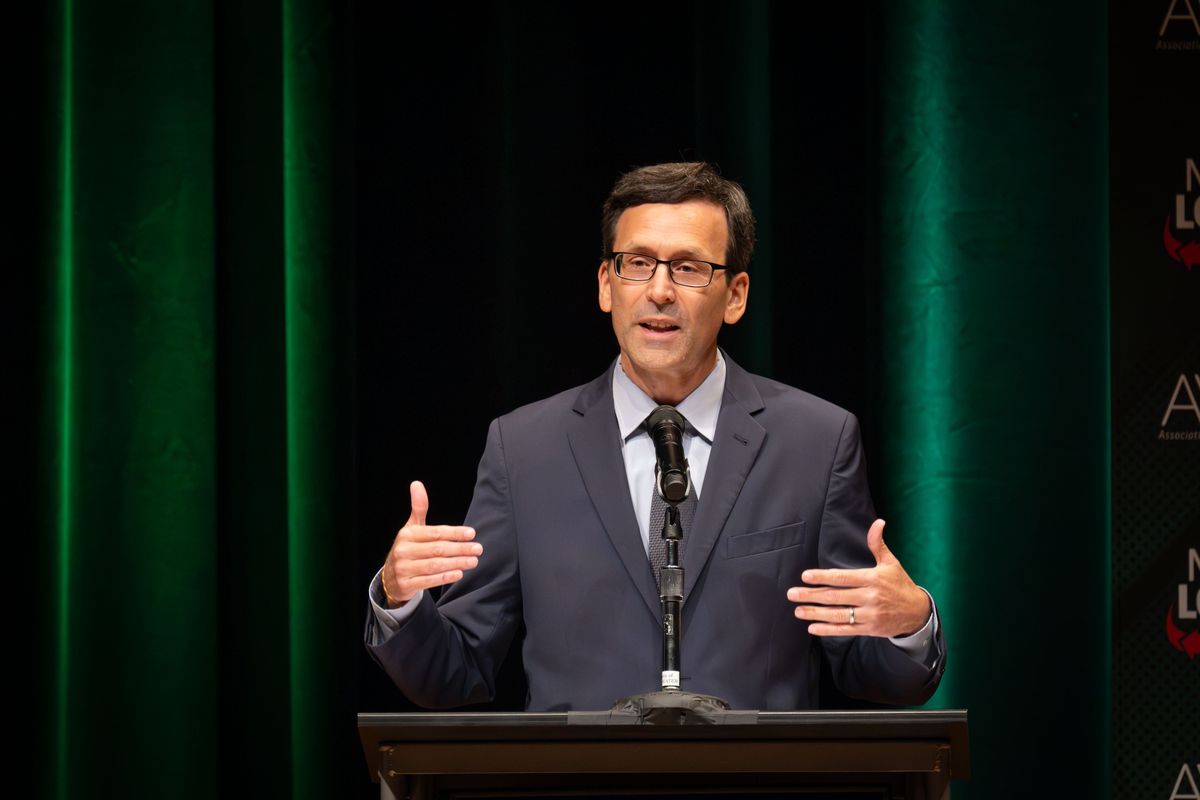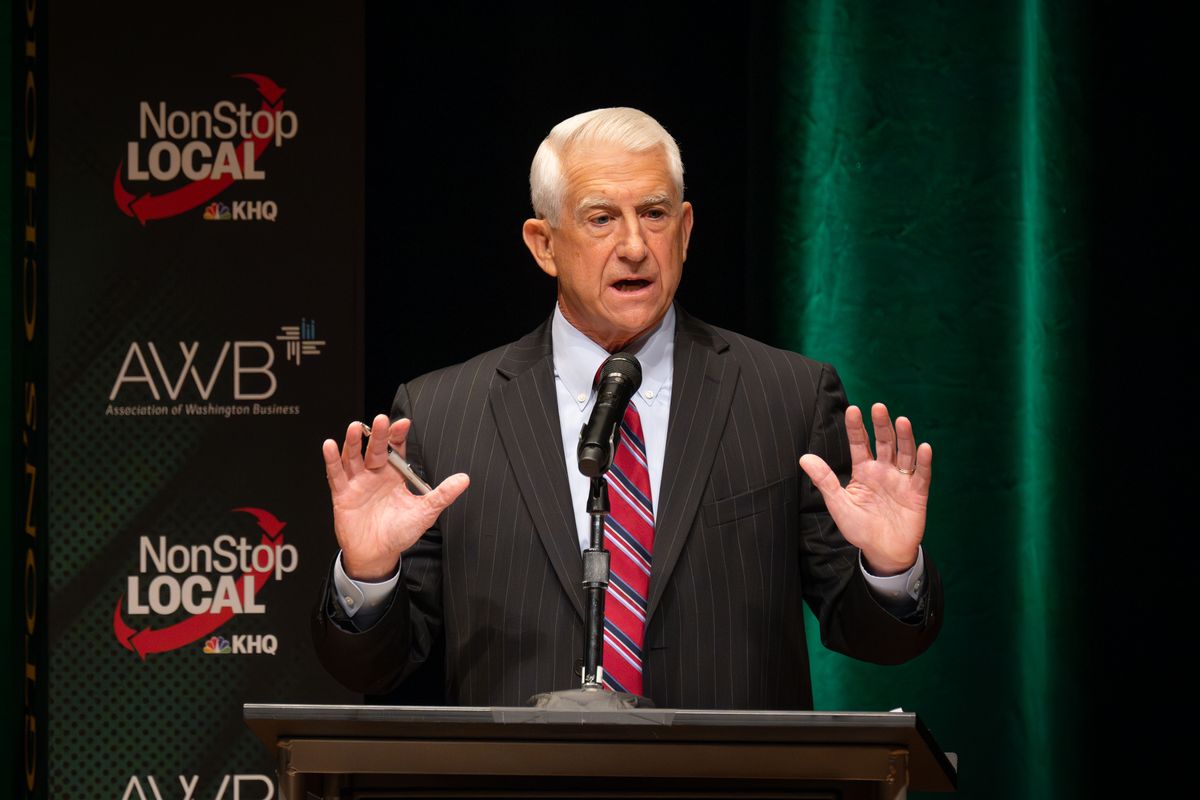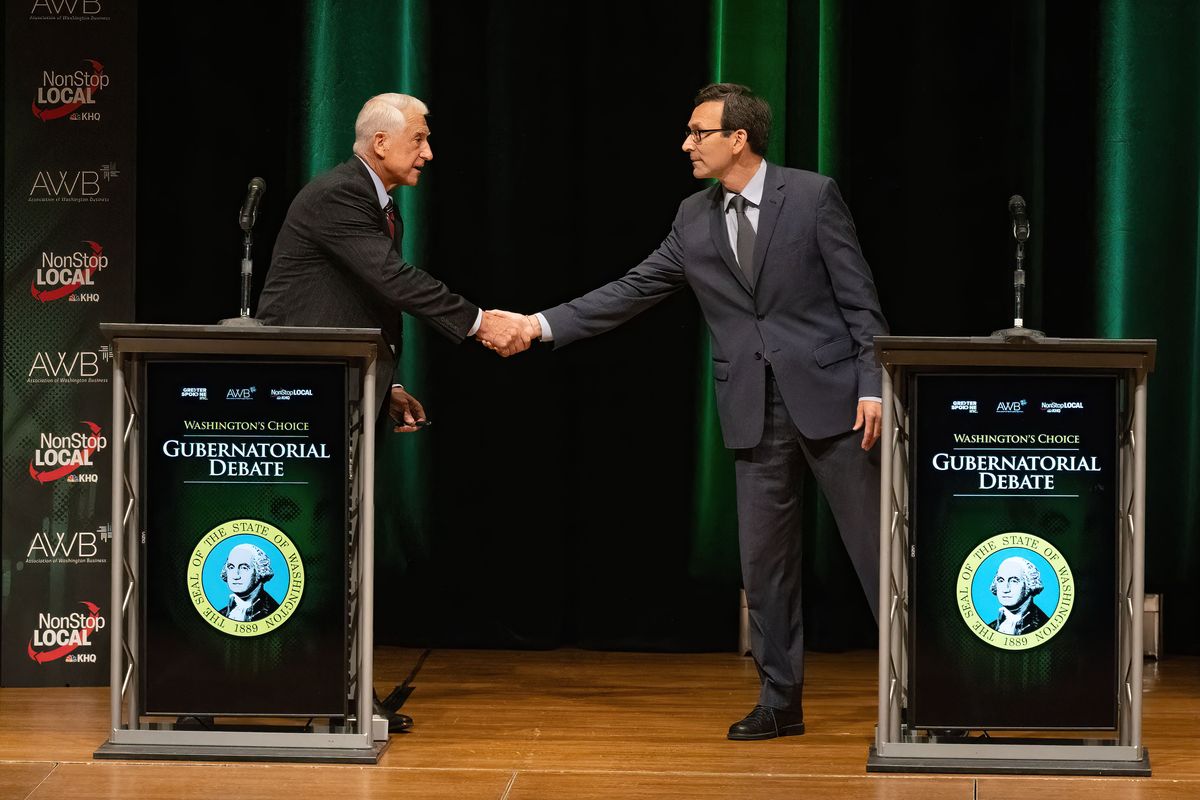In Spokane debate, candidates running for Washington governor argue over DEI programs and the housing crisis
Candidates Dave Reichert, left, and Bob Ferguson shake hands after their debate Sept. 18 at the Martin Woldson Theater at the Fox. (COLIN MULVANY/THE SPOKESMAN-REVIEW)
SPOKANE — A boisterous audience gathered Wednesday night in Spokane’s Fox Theater and ignored a debate moderator’s repeated direction to hold its cheers as Republican Dave Reichert and Democrat Bob Ferguson argued who should be the next Washington governor.
Reichert and Ferguson clashed over issues including how to solve the state’s housing crisis and whether state law should mandate education about diversity, equity and inclusion.
It was the pair’s second time sharing a debate stage in the past two weeks. On Sept. 10, the candidates met in Seattle and held heated arguments about state issues including farm workers’ rights and crime rates.
On Wednesday, a question about diversity, equity and inclusion programs drew a stark contrast between the opponents. The candidates were asked what direction they’d give to the Washington State Office of Equity in the midst of recent anti-DEI laws passed by Republican-led states.
Diversity, equity and inclusion laws are frameworks that seek to promote the fair treatment of historically underrepresented groups in places like offices and schools. In practice, the laws often take the form of mandatory school curriculums or work trainings that teach people about how to spot and avoid discrimination based on things like gender, race or physical ability.
“I don’t agree with DEI, but I do agree with treating people with respect and hiring the best people,” Reichert said. “That’s what I did when I was sheriff. I had an all-female staff – chiefs and majors, and the commander of my internal investigation unit.”
In response to the Diversity, equity and inclusion question, Ferguson said diversity is one of the great strengths of Washington, adding that fact is something he will defend if elected as governor.
Nonstop Local KHQ
“I just can’t help but point out that, once again, on audio, in the meeting in which you were behind closed doors … you expressed your opposition to marriage equality,” Ferguson said. “You said marriage is between a man and a woman.”
Reichert upheld his belief on the debate stage that marriage is “between a man and a woman,” saying that’s his faith, but that doesn’t mean he will enforce that belief on the people of Washington state.
In another question, a moderator posed a question about rent caps to address skyrocketing housing costs in the state, pointing out that nearly half of Washington renters spend more than a third of their income on housing.
The Federal Reserve Board describes people who spend more than that threshold of their income on rent as “rent burdened.” Last spring, state lawmakers shut down a proposed law that would have capped annual rent increases at 7%.
When asked if they support rent caps, both candidates failed to provide a “yes” or “no” answer.
Ferguson said if he’s elected, he promises 200,000 new units of housing will be built across the state before his first term ends.
“I’m open to proposals that address exorbitant hikes,” Ferguson said. “Look, the good news is, most landlords don’t want to do that. They want to play by the rules.”
To fix the housing crisis, Reichert said the state needs to make it easier for landlords to evict people who aren’t paying rent and “streamline the permitting system.”
“We need to change the squatting laws,” Reichert said. “You shouldn’t be allowed to move into someone’s house just to squat there.”
In Spokane County, courts saw record-breaking eviction actions filed last year. There were 1,663 eviction actions filed in 2023 – the highest seen by the county in eight years and a nearly 50% increase from the number filed in 2019.
In Washington, Black and Indigenous tenants and other tenants of color are disproportionately impacted by evictions and forced into homelessness. Some 35% of Black households in the state own their homes, compared with 68% of white households, according to a 2023 Seattle Times report.
The debate was live-streamed on the internet, broadcast on KHQ and archived at www.c-span.org. It was the keynote of an annual event put on by the Association of Washington Business, a lobbying organization that represents small businesses and large corporations based in the state. The organization also hosted debates for other state races earlier in the day, including the contest for Washington’s next attorney general.
A ticket to attend the annual Policy Summit cost $500 dollars, according to the Association of Washington Business. But that price tag got you into a day’s worth of debates and panel discussions. Stand-alone tickets to the gubernatorial debate were not offered to the public.
To learn more about the candidates running for Washington state governor, check out The Spokesman-Review’s recently published overview of the race as well as its coverage of the first debate earlier this month.


